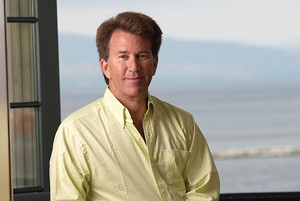Published July 7, 2010 at 7:55 a.m.
In a state where socially responsible businesses are almost as common as cows, Seventh Generation manages to stand out for its corporate do-goodism. The maker of nontoxic household products is ranked by The Better World Shopping Guide as “the top company operating on the planet today.”
Unlike many businesses that claim to have a social conscience, Seventh Generation strives to practice its principles in every aspect of its operations. And, because transparency is one of those principles, chairman Jeffrey Hollender readily admits that his company often falls short of that goal.
The 22-year-old eco-enterprise is molded very much in the image of its 55-year-old cofounder. Both in person and on the page, Hollender comes across as more activist than executive, more truth teller than huckster, yet he has deftly guided Seventh Generation to sustained profitability in a field dominated by Procter & Gamble, the fifth-largest corporation in the United States. Hollender’s firm has annual sales of about $150 million.
In a new book coauthored with Seventh Generation editorial director Bill Breen, Hollender argues that it’s no longer enough for a business to donate to charity and try to mitigate its negative impacts. The Responsibility Revolution: How the Next Generation of Businesses Will Win calls for redefining what it means to be a business. Companies must commit to social causes, “dare to wear the see-through” of organizational transparency and transform their workplaces into communities, Hollender and Breen insist. And that isn’t a utopian scenario, they add, citing companies such as British retailer Marks & Spencer that are making money and starting a revolution.
Seven Days caught up with Hollender last week in Seventh Generation’s airy offices overlooking Lake Champlain on the Burlington waterfront.
SEVEN DAYS: Why did you write this book?
JEFFREY HOLLENDER: All of a sudden everyone is talking about corporate responsibility, but no one is practicing it in a serious way. The book is an effort to redefine CR so it can live up to its potential.
SD: What’s wrong with corporate responsibility as it’s been practiced?
JH: Companies consider themselves responsible if they establish a philanthropy that focuses on, say, water conservation. But that’s just an appendage to the business. If social responsibility isn’t embedded in the strategy of a business — and it seldom is — then it ends up being marginal and meaningless. Failure to embed the principles can actually be destructive to a company’s image. CR has to ultimately be holistic and systemic.
Another problem is that no one has ever defined what it takes to be socially responsible. And it can only be gauged if there’s enough transparency in a company to see whether it’s actually happening.
SD: How did you come to all this — the ethic of corporate responsibility and the founding of Seventh Generation?
JH: The first organization I started was nonprofit: the Skills Exchange of Toronto in 1976. I was hanging out with my girlfriend prior to getting deported two years later for not having a work permit. But that’s another story.
My second business [Network for Learning, based in New York City] was for-profit and not particularly socially responsible. It had the same concept as the first one but no criteria for how it made money. I did make money, but it was an unsatisfying experience.
I’ve come to see business as increasingly the dominant force on the planet. If business isn’t engaged in addressing the planet’s problems, efforts to do that are not going to be successful. We’re moving out of an age when governments or religion were primary drivers in addressing these problems.
The origins of Seventh Generation are in a mail-order company called Renew America that sold energy- and water-conservation products. Alan Newman [now the owner of Magic Hat Brewing Company] got the rights to Renew America, and I raised money for a new business based on it. Alan and I became partners in Seventh Generation. We went our separate ways after a couple of years.
SD: You came of age during the late ’60s and early ’70s. Did that influence your values?
JH: Totally. I grew up with the sense that we have a responsibility to do something about the problems in the world. I was in lots of anti-Vietnam War demonstrations as a high school student [at Riverdale Country School in the Bronx].
SD: You say in the book that a company has to make beneficial products as well as take progressive stands in order to qualify as truly responsible. Does that mean you don’t view Ben & Jerry’s as socially responsible because it makes an unhealthy product?
JH: Ben & Jerry’s is a responsible business. They’ve addressed product issues by using organic milk and by selling sorbet. Compared to 10 years ago, their product is more healthy. It’s about the process and the evolution.
Our products are less bad than Procter & Gamble’s, but that doesn’t make them good. We use a lot of energy and water in manufacturing.
Someone in England asked me at a meeting that, if we’re so green, why don’t we make bidets instead of toilet paper? Isn’t that more sustainable?
Maybe that’s not practical in the marketplace, but it’s true there are too many people in the world to support the use of even the products we sell on a sustainable basis.
SD: Your approach has been financially successful for Seventh Generation.
JH: The loyalty people have to our products is unlike the loyalty for most consumer products. We spend much less money on advertising than most companies our size, and we’ve grown significantly in each of the last 10 years.
Will we be the most profitable company in world? No. We don’t have aspirations for that, and neither do our investors.
Think about it — business is basically a vehicle for transferring money from the poor to the rich.
Today, 20 percent of our company is owned by the employees. We have the aspiration to put an ESOP [employee stock ownership plan] in place in the next five years. That’s a fundamental principle.
SD: It looks as though some companies are getting more irresponsible despite all the rhetoric about responsibility. I’m thinking of BP and the behavior of Wall Street banks.
JH: The regulatory process was totally corrupt in the case of BP. There has to be real regulation. On the financial meltdown, the industry’s lobbyists spend twice as much as any other set of lobbyists. We have to keep that kind of money out of politics.
But no one of these things is the answer. There’s also a need for consumers to make more intelligent decisions.
I’m on the board of Greenpeace, so I obviously believe we need aggressive [nongovernment organizations] to tackle corporate misbehavior. At Seventh Generation, we want to be activists. We need to have people from the activist community inside our business.
We have to be almost viciously critical of our own business. In regard to transparency, we do an outstanding job because we’re so self-critical.
But that doesn’t mean we’re perfect and everyone else isn’t.
SD: As someone who ran an organization that offered an “Intro to Marxism” course, you must be familiar with Marx’s view that irresponsibility and injustice are inherent to capitalism. Seventh Generation is part of the capitalist system. Is that a contradiction in your philosophy?
JH: I don’t look at things as black and white as Marx did. Have you read Gar Alperovitz [radical historian and author of America Beyond Capitalism]? It’s clear there’s been more than one form of capitalism. Northern Europe has wonderful social attributes and still has capitalist economies. We need a more equitable form of capitalism. What we see in this country today is the worst face of capitalism.
It’s totally shortsighted. The concentration of wealth in the U.S. and the world is terrible for business. We need a large, healthy and sustainable middle class. If you’re selling toilet paper and laundry detergent, you need a broad, sustainable middle class to buy it.
SD: What are you going to do personally in the next few years? Retire?
JH: My aspiration is to become a full-time activist. I see it as a form of acupuncture: There are places you need to exert pressure for the overall health of the system. I’d focus on bringing about full-cost accounting. If you counted the total impact of business, that would be the single best way of restructuring corporate behavior.
SD: You say that employee ownership is a fundamental principle of Seventh Generation. Is it therefore a fundamental principle not to sell the business to a larger corporation? The book notes that some socially responsible businesses lose their cachet when taken over by a conglomerate — Burt’s Bees being bought by Clorox, for instance.
JH: It’s absolutely a principle. We have had many offers from companies interested in buying our business. We haven’t pursued them because we don’t believe that being part of a big company will help us achieve what we want to achieve. It might help us accelerate sales, but that’s not our main goal.
You should realize, though, that I don’t have complete ownership of Seventh Generation. It’s up to our investors to make decisions, but I know it’s our aim to remain independent.
SD: Please say something about what it means for Seventh Generation to be based in Burlington, Vt.
JH: I live in a business community here that is unique in the world. We’re reminded of why we do what we do every time we look out the window.
I see Vermont as a lab of what is possible. If we can’t make it happen here, can it happen anywhere?
Want to read it?
The Responsibility Revolution: How the Next Generation of Businesses Will Win by Jeffrey Hollender and Bill Breen, Jossey-Bass, 240 pages. $27.95.
Vermont has a critical mass of enlightened employers - and, for almost 20 years, an organization that articulates their beliefs. Kirk Kardashian describes how Vermont Businesses for Social Responsibility's influence is growing. Earlier this year, it pushed through legislation to make Vermont a legal home for "benefit corporations" that have a "material positive impact on society and the environment." Two years ago, the state was the first in the nation to approve a corporate structure called Low-Profit Limited Liability. On our blog, Andy Bromage describes how a California newspaper saved itself by incorporating as an L3C in Vermont. The state is becoming a Mecca for alternative business ownership, and that's good, argues Seventh Gen founder Jeffrey Hollender, because the old model is broken. He tells Kevin Kelley, "I see Vermont as a lab of what is possible. If we can't make it happen here, can it happen anywhere?"
More By This Author
Speaking of Environment
-

Regulators Are Poised to Let Vermont Gas Buy Methane From a Distant Landfill
Oct 21, 2022 -

Video: Talking Trees With Burlington Arborists
May 5, 2022 -

Increasing Downpours Impede Efforts to Improve Lake Champlain's Water Quality
Aug 18, 2021 -

Vermont Senate Blocks Governor's Act 250 Reform Order
Feb 4, 2021 -

Scott's Executive Order to Update Act 250 Draws Fire
Jan 21, 2021 - More »
Comments
Comments are closed.
From 2014-2020, Seven Days allowed readers to comment on all stories posted on our website. While we've appreciated the suggestions and insights, right now Seven Days is prioritizing our core mission — producing high-quality, responsible local journalism — over moderating online debates between readers.
To criticize, correct or praise our reporting, please send us a letter to the editor or send us a tip. We’ll check it out and report the results.
Online comments may return when we have better tech tools for managing them. Thanks for reading.
















































